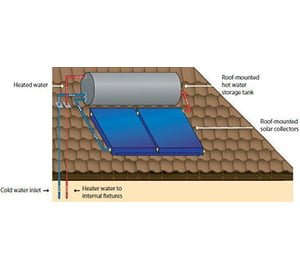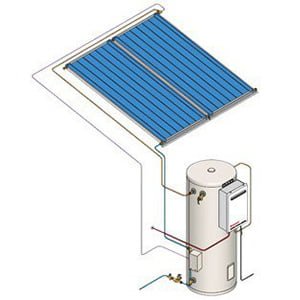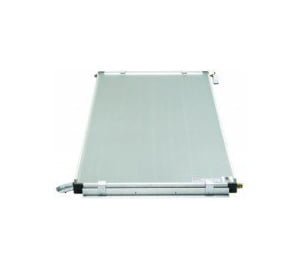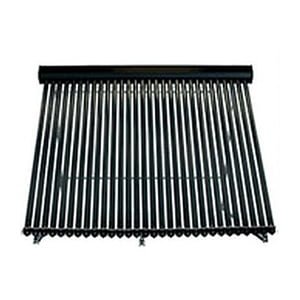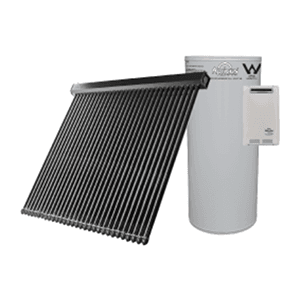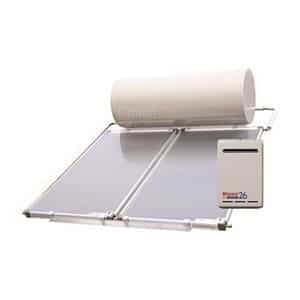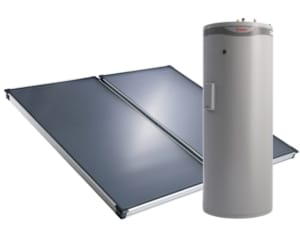Solar Hot Water Systems
Solar hot water is using the sun’s energy to heat the water, which will help you save energy, lower your hot water bills and reduce greenhouse pollution. With Solar you can save you up to 80% on your hot water energy costs.
Solar hot water systems can only be installed facing true north with an allowance of 45 degrees either side.
A typical solar hot water system is made up of solar collectors, a storage tank, a gas or electric booster and a solar controller and pump in the case of a split systems. The two types of systems available are:
Close Coupled Systems
Closed coupled systems have the storage tank above the solar collectors all located together on the roof. Close Coupled systems rely on thermosiphon, which is were the cold water from the bottom of the tank falls to the inlet at the bottom of the solar collector. The water is then heated by the sun, rising up through the solar collector and back into the middle and top of the tank.
Split Systems
Split systems have the storage cylinder located on the ground and the solar collectors located on the roof. Split systems use a solar controller and pump to transfer cold water from the tank to the solar collectors to be heated and returned to the tank. The solar controller compares the temperature of the water in the solar collector to that in the tank. When the collector is hotter than the tank the controller switches the pump on, transferring the solar heated water to the tank.
Solar Collectors
The solar collector is the most important component within the system as it absorbs the energy from the Sun and heats the water. The solar collectors are roof mounted and must face north when installed in Australia. Avoid having the collectors shaded by adjacent buildings, structures and trees. There are two types of Solar Collectors:
Flat Panel Collectors
Flat panels are made up of an insulated tray style case with a sheet of solar glass on the top surface. Beneath the glass is a solar collector surface, either one piece or multiple fins. This has multiple water / fluid channels attached to it. Sometimes known as a panel a flat plate solar collector is perfect for non-frost areas and close coupled systems.
Evacuated Tubes
Evacuated tubes are tubes with an inner glass tube providing a vacuum for heat retention. The energy that the tubes collect is transferred to the hot water manifold. Evacuated tube collectors are available in configurations using either 20, 22, 25 or 30 tubes. Frost prone areas are ideal locations to install evacuated tube solar collectors as they can withstand temperatures as low as -15°C. They must be installed on a split system.
Storage Tank
A storage tank should hold a one day’s supply of hot water and have enough capacity to store the amount of solar energy collected by the solar collectors. Once the tank size is chosen to match your household hot water use, the number of solar collectors is matched to the tank. For help with selection please contact our free call number 1800 689 919 or you can simple fill in the quick quote form and we will be in touch within 1-2 hours (within business trading hours).
Booster
A booster is required to ensure you never run out of hot water in times of low solar contribution or times of excessive hot water consumption. The 2 booster options available are gas boosted or electric boosted hot water storage tank.
Apricus
Apricus solar hot water systems come in 250, 315 and 400 litre storage tank and boosting options are instantaneous gas or electric hot water storage tank. Apricus back their products with a long term warranty with up to 15 years.
*Please look at the system model you require for exact warranty condition, warranty conditions apply.
Rinnai
Rinnai solar hot water systems comes in 180, 200, 250, 315 or 330 litre storage tank and boosting options are instantaneous gas or electric storage tank. Rinnai back their products with a long term warranty with up to 10 years.
*Please look at the system model you require for exact warranty condition, warranty conditions apply
Rheem
The Rheem solar hot water systems range includes both split, ground mounted systems and complete roof mounted models in a variety of capacities from 180 – 410 Litres. Rheem solar systems are available with electric or gas boosting, providing hot water during cloudy or rainy weather.
*Please look at the system model you require for exact warranty condition, warranty conditions apply.
Solar Tempering Valves
A tempering valve mixes your hot and cold water to deliver hot tap water at a constant temperature. Tempering valves have a temperature sensitive element which adjusts the mix depending on the temperature of the incoming water flowing through the valve. The valve is designed to maintain a constant outlet temperature, reducing the risk of accidental scalding. The regulation in NSW is 50ºC for all bathrooms and 45ºC for childcare and elderly care facilities. Your tank temperature setting at the thermostat must be a minimum of 60c. This prevents bacteria and diseases growing. The average temperature of domestic hot water is 70 ºC. A much safer temperature for domestic hot water is 50 ºC. This is because water at a lower temperature takes longer to cause injury. For example:
- At 60 ºC, it takes one second for hot water to cause third-degree burns
- At 55 ºC, it takes 10 seconds for hot water to cause third-degree burns
- At 50 ºC, it takes five minutes for hot water to cause third-degree burns
For more information on the Tempering valve requirements please click here to see Fair Trading NSW fact sheet
What is the STC Rebate?
The Australian Government lists solar water heaters and heat pumps that are eligible for STCs and are therefore eligible to receive a rebate based on the number of STCs awarded that can be traded for cash, or a discount, on the purchase price of a hot water system. An STC is a calculation of how much energy is expected to be saved over ten years when using a solar water heater or heat pump compared to the electricity consumption of an equivalent electric water heater. 1 x STC is 1 x MWh of electricity saved over 10 years = 100 kWh saved in a year. Performance calculations take into account geographic location, solar radiation, the angle of the sun, the efficiency of the solar collector, tank heat loss, cold water temperatures, the quantity of hot water used and hot water usage patterns. The more STCs awarded to a system equate to a higher rebate available on the purchase of that system. As of the 1st of January 2022, the start of the phasing out of the STC rebate meaning the 1st of January each the quantity of eligible certificates will decline by 10% ending in 2030.
What is the NSW Energy Saving Scheme?
The NSW Energy Savings Scheme (ESS) provides a list of solar water heaters and heat pumps that are eligible for Energy Saving Certificates (ESC’s). Generally, householders and businesses who fund energy savings activities transfer the right to create Energy Saving Certificates (ESC’s) to an Accredited Certificate Providers (ACPs) in return for a discount on the purchase of the hot water system. The program aims to reduce energy consumption within NSW, reduce energy costs for consumers and reduce the need for investment in new energy infrastructure. Energy Savings Certificates (ESCs) represent the energy saved from completing a compliant energy savings activity in NSW such as installing an energy saving solar water heater or heat pump. The more ESCs awarded to a system equate to a higher rebate available on the purchase of that system.
Who is eligible for the STC Rebate or NSW Energy Saving Scheme?
If you are installing an approved solar hot water system or heat pump, whether it be on a new build, replacing an old system. Terms and Conditions Apply. For more information contact our team on 1800 689 919 or simply book online for your free onsite assessment.
Solar Advantages
Read more about the benefits of a Solar Hot Water System

